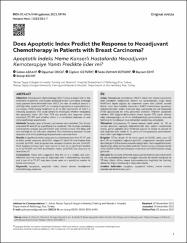| dc.contributor.author | Askan, Gökçe | |
| dc.contributor.author | Okcu, Oğuzhan | |
| dc.contributor.author | Öztürk, Çiğdem | |
| dc.contributor.author | Öztürk, Seda Duman | |
| dc.contributor.author | Şen, Bayram | |
| dc.contributor.author | Bedir, Recep | |
| dc.date.accessioned | 2023-09-27T08:24:37Z | |
| dc.date.available | 2023-09-27T08:24:37Z | |
| dc.date.issued | 2023 | en_US |
| dc.identifier.citation | Askan, G., Okcu, O., Ozturk, C., Duman Ozturk, S., Sen, B., & Bedir, R. (2023). Does Apoptotic Index Predict the Response to Neoadjuvant Chemotherapy in Patients with Breast Carcinoma?. Medeniyet medical journal, 38(1), 1–7. https://doi.org/10.4274/MMJ.galenos.2022.59196 | en_US |
| dc.identifier.issn | 2149-2042 | |
| dc.identifier.uri | https://doi.org/10.4274/MMJ.galenos.2022.59196 | |
| dc.identifier.uri | https://hdl.handle.net/11436/8393 | |
| dc.description.abstract | Objective: Neoadjuvant chemotherapy (NACT) plays a major role in the treatment of patients with locally advanced breast carcinoma. Although most patients have benefited from NACT, the rate of residual tumors is still high after treatment (AT). An increase in apoptosis is expected in tru-cut biopsy (TCB) during treatment or AT as the mechanism of NACT is inducing apoptosis. This study aimed to investigate whether evaluating the apoptotic index (AI) from TCB can predict the response before treatment (TC-BT) and whether there is a correlation between AI and clinicopathologic parameters. Methods: Seventy cases of breast carcinomas were included. The AI was evaluated BT and AT by quantifying the apoptosis. The receiver operating characteristic analysis was performed with overall survival (OS) data, and low and high AI cut-offs were obtained. The relationship between AI and response and clinicopathological parameters was evaluated. Results: A significant relationship was found between low AI in TC-BT and at least partial response (p=0.025), longer OS (p=0.01) and disease-free survival (p=0.01), and progesterone receptor-positive tumors (p=0.03). Her2-negative tumors were more prone to low AI. A significant decline in AI (p=0.001) and Ki67 proliferation index (p[removed] | en_US |
| dc.language.iso | eng | en_US |
| dc.publisher | Galenos Publishing | en_US |
| dc.rights | info:eu-repo/semantics/openAccess | en_US |
| dc.subject | Apoptosis | en_US |
| dc.subject | Apoptotic index | en_US |
| dc.subject | Breast cancer | en_US |
| dc.subject | Neoadjuvant chemotherapy | en_US |
| dc.subject | Response | en_US |
| dc.title | Does apoptotic index predict the response to neoadjuvant chemotherapy in patients with breast carcinoma? | en_US |
| dc.title.alternative | Apoptotik indeks meme kanserli hastalarda neoadjuvan kemoterapiye yanıtı predikte eder mi? | en_US |
| dc.type | article | en_US |
| dc.contributor.department | RTEÜ, Tıp Fakültesi, Cerrahi Tıp Bilimleri Bölümü | en_US |
| dc.contributor.institutionauthor | Askan, Gökçe | |
| dc.contributor.institutionauthor | Okcu, Oğuzhan | |
| dc.contributor.institutionauthor | Öztürk, Çiğdem | |
| dc.contributor.institutionauthor | Öztürk, Seda Duman | |
| dc.contributor.institutionauthor | Şen, Bayram | |
| dc.contributor.institutionauthor | Bedir, Recep | |
| dc.identifier.doi | 10.4274/MMJ.galenos.2022.59196 | en_US |
| dc.identifier.volume | 38 | en_US |
| dc.identifier.issue | 1 | en_US |
| dc.identifier.startpage | 1 | en_US |
| dc.identifier.endpage | 7 | en_US |
| dc.relation.journal | Medeniyet Medical Journal | en_US |
| dc.relation.publicationcategory | Makale - Uluslararası Hakemli Dergi - Kurum Öğretim Elemanı | en_US |


















